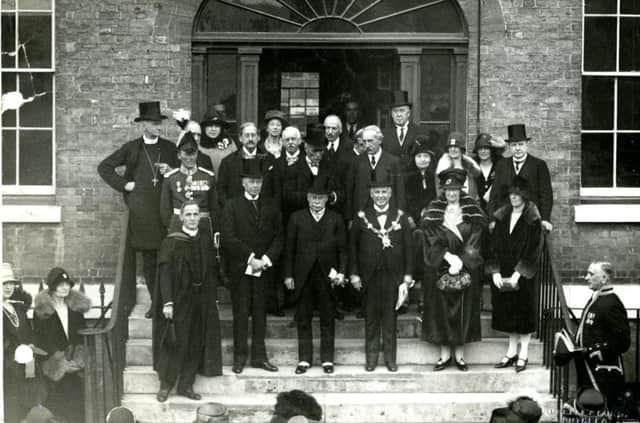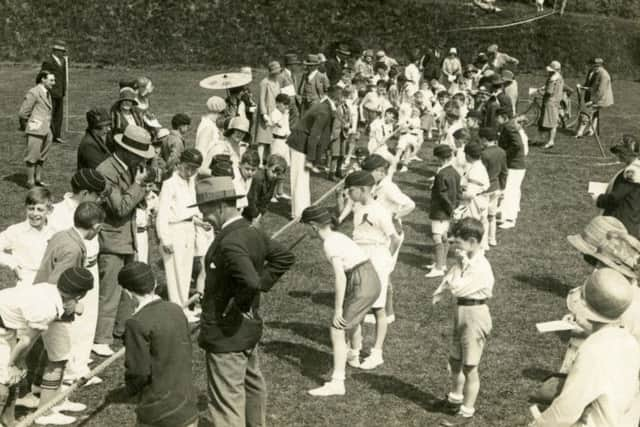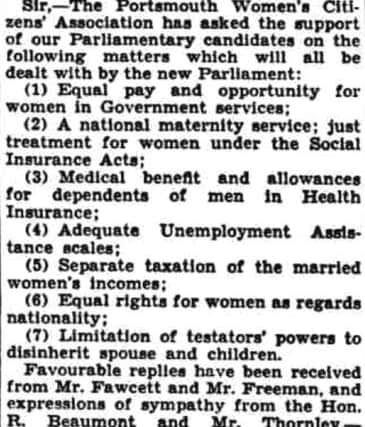NOSTALGIA: A red bluestocking at Portsmouth Grammar School


Before female teachers were taken on at the all-boys school during the Second World War, women involved in school life at PGS played a very different role.
They excelled at making tea, smiling and distributing shiny cups and colourful ribbons. At least that is what the school magazine, The Portmuthian, suggested at the time.
Advertisement
Hide AdAdvertisement
Hide AdThe traditional role of mother-provider and maiden-admirer prevailed for many years.


Boys tugged hard in wars on the playing fields of Hilsea, lifted their cups high with pride and drank appreciation. All was well. God was in His heaven.
One day in 1926, a woman by the name of Dorothea Barton, came to the school.
She did not gain entry on her own merits. She was married to the headmaster, Canon Walter Barton, a status which enabled her to get past the porter.
Advertisement
Hide AdAdvertisement
Hide AdBut her academic qualifications equalled those of her husband and exceeded those of most of the teaching staff. She had been to Cambridge and had taught at the London School of Economics.


There are no identifiable photographs of Dorothea in the school archive, but we do know that she sung alto in the choral society and carried out the traditional role of headmaster’s wife with dignity and without complaint, dutifully distributing prize books on speech day, medals and cups on athletic sports day, and light refreshments at school concerts.
But there was more to Dorothea. New information reveals that she had been, at the very least, a suffragist, if not a suffragette. The difference was significant.
A suffragist stated the case for equality but drew the line at suffering forced-feeding and self-sacrifice.
Advertisement
Hide AdAdvertisement
Hide AdThere was no doubt about Dorothea’s commitment. She was a feminist and also dabbled in socialism. To top it all, and make her everybody’s composite bete noire in the post war 1920s – especially in Portsmouth – she was of German and, very probably, Jewish descent.


During the First World War she was appointed a ‘Lady Inspector’ at the Board of Trade, which gave her some insight into women’s employment conditions and problems, and, in 1919 as a fellow (sic) of the Royal Statistical Society, gave talks about the positive advance in women’s status during the war, their improved wages, skills and organisation.
Looking at the wartime rise in wages gave hope that ‘a permanently higher wage level would be gradually reached’.
The National Union of Societies for Equal Citizenship published her article ‘Equal pay for equal work’ that same year and she went on to author other pamphlets arguing for equality.
Advertisement
Hide AdAdvertisement
Hide AdThe Bartons’ move to Portsmouth when her husband was appointed headmaster in 1926 did not inhibit her, or quell her activism. Soon after their arrival she became chairman (sic) of the Portsmouth Women Citizens’ Association, a post she held for the whole duration of her husband’s headship.


At the same time, the school archive reveals, Dorothea taught the more able boys. Evidence for this comes from Sydney Golt who described how she ‘coached us in economics and history’ when he was a pupil in the 1920s. He went on to be a senior civil servant and international trade specialist. Nearly 50 years after Dorothea’s work for the Board of Trade, Sydney became the under secretary of the Board of Trade.
Dorothea was not formally employed as a teacher and had no contract of employment – so much for ‘equal pay for equal work’. But she does appear to have a good claim to having been the first female teacher at PGS.
Dorothea was still alive when the first girl pupil was admitted to the school in 1976. She died in 1983 at the age of 99.
Advertisement
Hide AdAdvertisement
Hide AdAs a lifelong campaigner for equal rights, Dorothea can take some credit for being part of a movement that paved the way for the success that is co-education and ultimately to Dr Anne Cotton’s appointment.